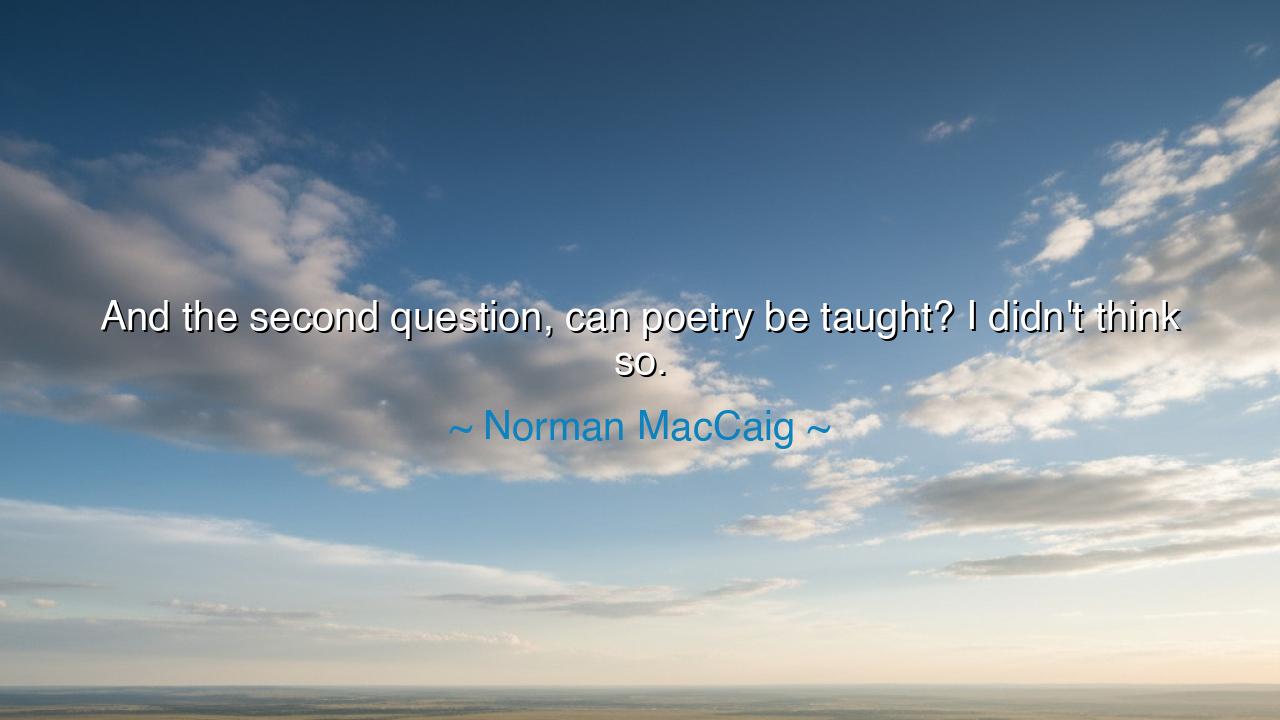
And the second question, can poetry be taught? I didn't think






Hear the voice of Norman MacCaig, poet of Scotland, who asked with candor: “And the second question, can poetry be taught? I didn’t think so.” Within this brief statement lies a wisdom that echoes through the ages. For MacCaig does not dismiss the teaching of form, or the sharing of inspiration, but he challenges the very notion that the essence of poetry—that sacred spark that makes words alive—can ever be given from one hand to another. He reminds us that while craft may be guided, vision must be born within the soul.
The meaning of his words lies in the distinction between skill and spirit. A teacher may explain meter, rhyme, metaphor, and rhythm; these are the bones of verse. But the breath that animates poetry—the sudden image that pierces the heart, the rhythm that sings like wind in the trees—cannot be taught. It comes from a well deeper than instruction, from a way of seeing that belongs to the individual alone. MacCaig knew this, and so he laughed at the notion that poetry could be passed on like a formula.
The ancients too spoke of this mystery. Plato, though suspicious of poets, admitted they wrote by divine inspiration, as if possessed by a spirit beyond themselves. Horace urged poets to study craft, but he too declared that natural genius was indispensable. Aristotle, in his Poetics, described the mechanics of tragedy, but even he acknowledged that something beyond rules—an insight into human nature—was required. MacCaig’s doubt that poetry could be taught is but another phrasing of the old truth: technique may be shared, but the fire must be one’s own.
History offers vivid examples. Consider the case of William Blake. He had little formal training, and his contemporaries often dismissed him as eccentric. Yet his vision—his marriage of word and image, his fierce imagination—could not have been taught in any academy. Or think of Emily Dickinson, who lived in seclusion, learning from the rhythms of her own heart rather than from masters. No teacher gave her the strange power of her voice; it sprang forth from her solitude, her soul tuned to eternity. Their lives prove MacCaig’s conviction: poetry is awakened, not instructed.
And yet, MacCaig himself was a teacher of poetry. Does this make his words a contradiction? No—it makes them richer. For he must have known that while poetry cannot be taught in its essence, it can be nurtured. A teacher can prepare the soil, can point to beauty, can encourage persistence. But the act of creation itself, the true making of a poem, remains a solitary leap of the spirit. MacCaig’s doubt, therefore, is not cynicism, but humility. He acknowledges the limits of teaching and the mystery of art.
The lesson for us is clear: do not wait for another to give you your poetic voice. It cannot be handed to you. It must be discovered within. Teachers, books, and mentors may sharpen your tools, but the vision is yours to uncover. To write poetry—or to live poetically—you must train yourself to see what others overlook: the light in the common stone, the sorrow in the passing day, the grandeur hidden in the small. This is not taught; it is lived.
Practical wisdom flows from here. Read poetry, not to imitate, but to awaken your own perception. Walk in nature, observe carefully, write not for approval but for truth. When you learn technique, let it serve you, not enslave you. Above all, write from your own life, your own heart. Poetry cannot be taught, but it can be born—born from your honesty, your courage, and your willingness to look deeply at the world.
Thus, Norman MacCaig’s words endure as a paradox and a challenge: poetry cannot be taught, but it can be found. The poet is not made in classrooms, but in the silence of observation, the struggle of expression, and the fire of inspiration. Let future generations remember: the teacher may guide, but the voice must be your own. And when it comes, it will not sound like your master’s voice, but like yours—and that is what makes it poetry.






TTrang
I appreciate MacCaig’s candor here. His doubt makes me think that poetry belongs to the realm of feeling, intuition, and lived experience rather than formal instruction. Yet, I also believe sharing poems, discussing language, and exploring technique can ignite creativity in others. Maybe the real question isn’t whether poetry can be taught, but whether it can be taught in the same way we teach other subjects. Perhaps it’s more about awakening than instruction.
LLeeAnh_BR2
MacCaig’s perspective raises a timeless debate about the relationship between art and education. If poetry can’t be taught, what role do writing workshops and creative writing programs really play? Perhaps they don’t teach poetry itself but help nurture the discipline and sensitivity needed for it. I wonder if he saw poetry as too spiritual or instinctive to fit within academic structures—or if he simply distrusted how institutions attempt to define artistic expression.
QNQuya Nguyen
I find this statement both humbling and frustrating. On one hand, MacCaig is acknowledging the mysterious nature of poetic talent; on the other, it feels discouraging to aspiring poets. Surely, while inspiration can’t be taught, craft can be refined, right? I’d like to ask him whether he believes mentorship or reading great poetry could at least awaken a poetic sensibility. Isn’t teaching, in some sense, about helping others find their own voice?
TLThanh Long
MacCaig’s doubt about whether poetry can be taught strikes a chord with me. I’ve always wondered if creativity is something that can be cultivated or if it’s an innate gift. You can teach someone the mechanics of language—meter, imagery, symbolism—but that doesn’t necessarily make them a poet. Maybe what he means is that poetry isn’t learned but discovered within oneself. Do you think teaching can inspire that discovery, or does it risk stifling it?